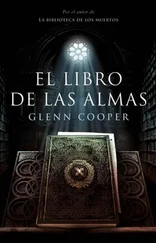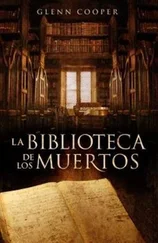Glenn Cooper - Book of Souls
Здесь есть возможность читать онлайн «Glenn Cooper - Book of Souls» весь текст электронной книги совершенно бесплатно (целиком полную версию без сокращений). В некоторых случаях можно слушать аудио, скачать через торрент в формате fb2 и присутствует краткое содержание. Жанр: Триллер, на английском языке. Описание произведения, (предисловие) а так же отзывы посетителей доступны на портале библиотеки ЛибКат.
- Название:Book of Souls
- Автор:
- Жанр:
- Год:неизвестен
- ISBN:нет данных
- Рейтинг книги:5 / 5. Голосов: 1
-
Избранное:Добавить в избранное
- Отзывы:
-
Ваша оценка:
- 100
- 1
- 2
- 3
- 4
- 5
Book of Souls: краткое содержание, описание и аннотация
Предлагаем к чтению аннотацию, описание, краткое содержание или предисловие (зависит от того, что написал сам автор книги «Book of Souls»). Если вы не нашли необходимую информацию о книге — напишите в комментариях, мы постараемся отыскать её.
Book of Souls — читать онлайн бесплатно полную книгу (весь текст) целиком
Ниже представлен текст книги, разбитый по страницам. Система сохранения места последней прочитанной страницы, позволяет с удобством читать онлайн бесплатно книгу «Book of Souls», без необходимости каждый раз заново искать на чём Вы остановились. Поставьте закладку, и сможете в любой момент перейти на страницу, на которой закончили чтение.
Интервал:
Закладка:
Dinner followed, accompanied by readings from the Bible or the life of a saint. Edgar had the advantage over some of his less fortunate classmates of being one of the rich pensionnaires, who were fed at a common table where there was a minimum standard of daily rations. Les pauvres had to fend for themselves in their rooms, and some were close to starvation. As it was, Edgar’s daily fare barely kept him going-bread, a little boiled fruit, a herring, an egg, and a piece of cheese, washed down with a jar of the cheapest wine, a third of a pint topped off with water.
At twelve o’clock, the students had an assembly, where they were questioned about their morning’s work. This was followed by a rest period or a public reading, depending on the day. From three to five o’clock, they were back in the classroom for afternoon classes, then off to the chapel for Vespers, immediately followed by a discussion of their afternoon work. Supper consisted of some more bread, another egg or a chunk of cheese, and perhaps a piece of fruit eaten to the accompaniment of droning Bible readings. The tutors had one more opportunity to interrogate their charges before final chapel, and at eight o’clock it was bedtime.
Two days a week there was time in their schedules for an interlude of recreation or a walk. Despite the temptation for escape, albeit brief, the environs around the College were such that students mainly stuck to the Pre aux clercs, the college recreation ground. The other side of rue Saint Symphorien was a stinking nest of thieves and vermin who would gladly cut the throat of a student for a cloak pin or a pair of gloves. And to make matters even more unsavory, the sewers of Montaigu discharged directly onto the street, making for unhealthy and unwholesome circumstances.
Still hungry after breakfast, Edgar made his way to the grande classe with mounting feelings of dread. The discussion today would concern indulgences and the Exurge Domine, the discourse written by Pope Leo X condemning the errors of Martin Luther. It was a topic that was hot with controversy and thus, ripe for disputation. Edgar fretted that the tutor, Bedier, would call upon him as he had been spared the past week. The students, all twenty of them, took their seats at two rows of low benches, huddled shoulder against shoulder for warmth. Dawn was breaking, and a thin light seeped through the tall narrow windows of the dusty lecture hall. Bedier, fat and pompous, paced the floorboards, gripping his whipping rod like a cat about to pounce on a rat. As Edgar feared, the first words to drip from his thick lips were, “Monsieur Cantwell, rise.”
He stood at the bench and swallowed hard.
“Tell me the three ways in which we may be granted penance?”
He was relieved he knew the answer. “Confession, priestly absolution, and satisfaction, Master.”
“And how may satisfaction be achieved?”
“Good works, Master, such as visiting relics, pilgrimage to holy places, praying the rosary, and purchasing indulgences.”
“Explain the meaning of per modum suffragii.”
Edgar’s eyes widened. He had no idea. It was useless to guess as it would make matters worse for him. “I do not know, Master.”
The fat tutor demanded he come forward and kneel. Edgar approached like a fellow walking to the gallows and knelt before the cleric, who whipped him four times on the back with all his might. “Now stand beside me, Monsieur, as I suspect this bee will need to sting you again. Who knows the answer?”
A pale young man stood up from his place in the first row. Jean Cauvin was tall and skeletal, a hollow-cheeked eighteen-year-old with an aquiline nose and the wispy beginnings of a beard. He was the finest student at Montaigu, bar none, his intellect often dwarfing the tutors’. In preparation for university study and a career in the priesthood, he had been sent to Paris by his father from their home in Noyon at age fourteen to attend the College de Marche. After excelling in grammar, logic, rhetoric, astronomy, and mathematics he transferred to Montaigu for religious preparation. Edgar had had scant dealings with him so far. The boy seemed as cold and imperious as the masters.
Bedier acknowledged him, “Yes, Cauvin.”
“If it pleases, Master,” he said haughtily, “I have taken to Latinizing my name to Calvinus.”
Bedier looked heavenward. “Very well then. Calvinus.”
“It is an act of intercession, Master. Since the Church has no jurisdiction over the dead in purgatory, it is taught that indulgences can be gained for them only by an act of intercession.”
Bedier wondered about the boy’s use of language-“is taught” being different from “I believe,” but he let it pass as his attention was on the English boy. He bade to Jean sit down. “Tell me, Cantwell, what did Pope Leo X say in his Exurge Domine, concerning the souls in purgatory?”
Edgar could not remember. He had repeatedly dozed off while reading the tract, and all he could do was desperately brace himself for another beating. “I do not know, Master.”
This time Bedier went for bare skin, landing blows on his neck and cheek, drawing blood. “What did they teach you at Oxford, boy? Are the English not God-fearing? You will have no dinner on this day but will, instead reread and memorize the Exurge Domine. Who will answer me?”
Jean stood again and began to respond while Edgar cowered and tasted blood, which flowed from his cheek to his lips.
“Pope Leo wrote that the souls in purgatory are not certain of their salvation, and he further claimed that nothing in the Scriptures proves that they are beyond the state of meriting from indulgences.”
There was something in Jean’s tone, a note of skepticism, that unsettled the cleric. “Is this not what you, yourself believe, Cauvin-I mean Calvinus?”
Jean lifted his chin and answered defiantly. “I believe the Pope is the only one who does excellently when he grants remissions to the souls in purgatory on account of intercessions made on their behalf. For I believe, as others do, that there is no divine authority for preaching that the soul flies out of purgatory the moment the indulgence money clinks in the bottom of the chest!”
“Come here!” Bedier raged. “I will not tolerate Lutheran heresy in my classroom!”
“Do you intend to beat me?” Jean asked, provocatively. None of his fellow students could recall him ever receiving the whip, and they exchanged excited glances.
“I do, monsieur!”
“Well then, I shall make it easy for you.” Jean strode forward, stripping off his cloak and his shirt, and knelt beside Edgar. “You may proceed, Master Bedier.”
As the rod landed on his flesh, Edgar saw Jean looking over at him, and he swore he saw the boy wink.
Martin Luther had never been to Paris but his influence was surely felt in that city as it was throughout the Continent. The monk from Wittenberg had exploded onto the religious scene on the day in 1517 he nailed his 95 Theses onto the door of Wittenberg Cathedral and began railing against the corrupt state of the Papacy and the abusive power of indulgences.
In the modern era of the printing press, certificates of indulgence had become a lucrative business for the Church. Indulgence salesmen would come into a town, set up their wares in a local church, suspending all regular prayer and service. Their certificates were mass-produced, with blank spaces for names, dates, and prices, and all good Christians were obligated, for the sake of their dead friends and relatives and for their own souls, to purchase this afterlife insurance to speed the sinner’s exit from purgatory to heaven. Luther found the practice vile and replete with ecclesiastical errors and feared for the fate of people who believed that salvation could be bought. The priests in Wittenberg had a loathsome saying that sickened him, “As soon as a coin in the coffer rings, another soul from purgatory springs.”
Читать дальшеИнтервал:
Закладка:
Похожие книги на «Book of Souls»
Представляем Вашему вниманию похожие книги на «Book of Souls» списком для выбора. Мы отобрали схожую по названию и смыслу литературу в надежде предоставить читателям больше вариантов отыскать новые, интересные, ещё непрочитанные произведения.
Обсуждение, отзывы о книге «Book of Souls» и просто собственные мнения читателей. Оставьте ваши комментарии, напишите, что Вы думаете о произведении, его смысле или главных героях. Укажите что конкретно понравилось, а что нет, и почему Вы так считаете.












